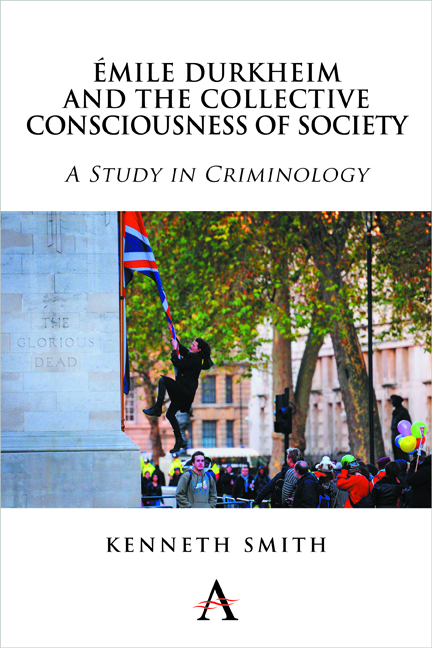Book contents
- Frontmatter
- Dedication
- Contents
- Epigraph
- Preface
- Introduction
- Part I The Concept of the Collective Consciousness of Society
- Preface to Part I
- Introduction to Part I
- 1 Durkheim on the Collective Consciousness in Moral Education
- 2 Durkheim's Other Writings on the Concept of the Collective Consciousness
- 3 Collective Consciousness, Common Consciousness, Collective Conscience or Conscience Collective?
- Conclusion to Part I
- Part II The Form of the Collective Consciousness
- Part III Durkheim on Crime and Punishment
- Part IV Social Fact or Social Phenomenon? Durkheim's Concept of the Collective Consciousness as a ‘Social Fact’
- Part V Some Problems with Durkheim's Concept of the Common and Collective Consciousness
- Conclusion
- Appendix: On Paying a Debt to Society
- Notes
- References
- Index
2 - Durkheim's Other Writings on the Concept of the Collective Consciousness
from Part I - The Concept of the Collective Consciousness of Society
Published online by Cambridge University Press: 05 October 2014
- Frontmatter
- Dedication
- Contents
- Epigraph
- Preface
- Introduction
- Part I The Concept of the Collective Consciousness of Society
- Preface to Part I
- Introduction to Part I
- 1 Durkheim on the Collective Consciousness in Moral Education
- 2 Durkheim's Other Writings on the Concept of the Collective Consciousness
- 3 Collective Consciousness, Common Consciousness, Collective Conscience or Conscience Collective?
- Conclusion to Part I
- Part II The Form of the Collective Consciousness
- Part III Durkheim on Crime and Punishment
- Part IV Social Fact or Social Phenomenon? Durkheim's Concept of the Collective Consciousness as a ‘Social Fact’
- Part V Some Problems with Durkheim's Concept of the Common and Collective Consciousness
- Conclusion
- Appendix: On Paying a Debt to Society
- Notes
- References
- Index
Summary
The collective consciousness is the highest form of psychic life, since it is the consciousness of the consciousnesses.
(Durkheim 1965, 492; emphasis added)It has sometimes been suggested that Durkheim made very little use the concept of the collective or the common consciousness after The Division of Labour, and even that he abandoned this concept altogether in his later writing. The authority for this claim appears to be Steven Lukes (1973, 5). However, as we have already seen, this is certainly not the case as far as his lectures on Moral Education are concerned – delivered between 1902 and 1907 and containing the most detailed exposition of this concept in all his sociology – and this reference alone would therefore seem to be sufficient to refute this claim.
The basis of this mistaken belief would seem to be the fact that the concept of the collective consciousness is almost entirely absent from his third book, Suicide (1897) – there is in fact only a single reference to this concept in the entire book – and is hardly mentioned at all in his second book, The Rules (1895). I say ‘almost entirely absent’ here and ‘hardly mentioned’ because although there are any number of references to the terms ‘conscience’, ‘consciousness’, ‘commune’ and ‘collective’ separately throughout these two books – and I think it is fair to say that Durkheim could hardly write a book without mentioning these terms – it is nevertheless conspicuous that Durkheim, having gone to all the trouble to develop the concept of the collective consciousness in The Division of Labour, does not make more use of it in The Rules, and especially in Suicide.
- Type
- Chapter
- Information
- Publisher: Anthem PressPrint publication year: 2014

